QuestionQUESTION: I got two rats off craigs list for my children. They came with a beutiful two story cage, and seemed to be well cared for. One of the rats is already 2 years old. She lightly coughs but seems healthy in all other ways. I really like this older rats personality and want to keep her alive as long as possible. I also don't want to waist a lot of money on vet bills or put her through the stress of going to a vet. What can I do to best care for her in my home. She has water in two areas a bowl and bottle. She came with a large pelit food, unlabled, which I have put in their cage. The cage is using special rat bedding. I have given her 5 cherrios for rewards, and some green leaf lettuce. There is a lot of recomendations on food and suppliments, but don't know how wise changing anything for her would be. Any special advice beyond vet trips to extend a rats life.
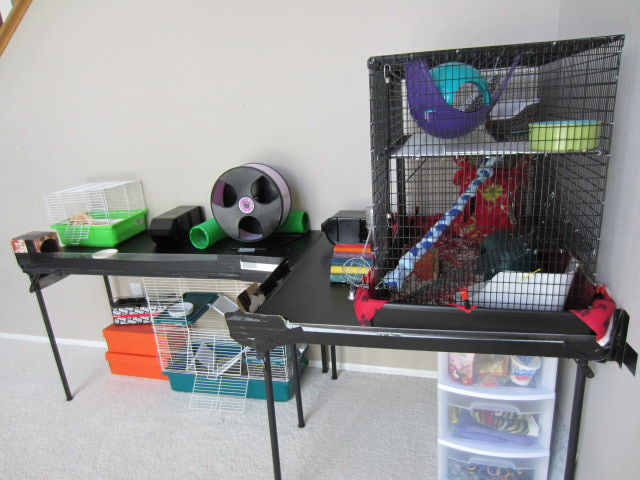 Rattie Penthouse
Rattie Penthouse
ANSWER: Hi. I am so glad you wrote to me about this as I take great pride in giving special care to all my ratties. First however, I want to advise you that despite your trying to avoid using a vet, you need to find and select a high quality vet that has specific experience with rats right now, before there is a problem. Because if and/or when one of your girls has a health issue, you will generally need to act fast and be prepared to know who you would take them to. With rats, often a medical issue (such as respiratory) needs immediate attention because they tend to take a downturn quickly if not attended to immediately. Ideally, you would want an exotic vet, but these are hard to find, but a vet with a special interest in exotics and experience with them will do. I can help you locate a good one if you tell me what large city you live in or near, if you wish.
That said, the other important fact you need to be aware of is that, like with humans, health and longeavity is determined for the most part by genetics. You got them on craigslist, but do you know where their prior owner got them? Rats coming from a good breeder will generally have better health and longeavity because they breed for that. Rats from a pet store are bred on rat farms, primarily for snake food, the sad truth. But that is not to say that a rat from a pet store can't live a long life, and rats from a breeder could die young as well.
The last fact I want to share, and you may already know, is that an average lifespan for a rat is 2 years, but some can live past 3 and some die short of 2...you just never know what health issues they are genetically predisposed to.
However, with all that out of the way, there is much you can do to provide the healthiest lifestyle for your girls. Rats tend to have respiratory issues, so good bedding is key. Pure Aspen wood shavings are the only wood product that is healthy, or you can choose a low-dust manufactured bedding such as Carefresh or Yesterday's News. Personally, I prefer to use fleece fabric cut to the size of the cage bottom, and change it out about 2x/week or when it begins to smell of urine. I provide a corner "potty" in which I use Carefresh bedding. The key to preventing respiratory issues in rats is to keep the urine odor to a minimum, so changing bedding often is important. Rats are also sensitive to odors in the air, so do not smoke, wear perfumes or use air freshener or burn candles anywhere that meets their air space.
Healthy diet is also critical. Rats require a very low fat/low protein diet. Their diet should be high in grains. It would be good for you to find out what kind of pellets the prior owner provided. They are probably (hopefully) a high quality lab block. One school of thought is that rats should have a constant supply of lab blocks in their cage at all times.
Harlan Teklad are one high quality lab block engineered by scientists that provide proportionately everything a rat would need in their diet. Rat owners who feed lab blocks as primary diet do not mix the lab blocks with any other dry mixes together with the lab blocks, because what happens is the rats will pick out the "good stuff" and not eat the lab blocks (they are very bland). Those who feed lab blocks do supplement their rats' diet with fresh fruits and veggies every day.
The other school of thought is use a dry mix of foods INSTEAD of lab blocks. In addition to the dry mix (which must be provided in their cage at all times, because rats have a high metabolism and graze frequently), fresh fruits and veggies should be provided daily.
I will not advocate one method over the other because both are healthy options, however, my own opinion is this: considering the short life our rats live, a daily diet of lab blocks is tremendously boring and bland. Rats have taste buds similar to humans and enjoy a variety. If you choose to go the latter option and use a rat mix rather than lab blocks, please DO NOT EVER buy a pet-store rat mix. They are amazingly unhealthy as they are too high in seeds and corn and are high in fat.
I make my own dry rat mix and have been doing so for years. My rats have always been healthy, which I partially attribute to a healthy diet. I will share my recipe with you. Believe me when I tell you it is very quick to make and much less expensive than pet store bagged mixes. I buy most of the ingredients in bulk from farmer's market type stores such as Henrys or Sprouts. I mix a whole bunch of it in a very large airtight container, and refill their bowls from there. This large container can last me for several months before I have to mix up a new batch, so as you can see, very easy. Here is the recipe (I mix equal amounts of all ingredients, except for the last few, where I state specifically):
- Plain Cheerios cereal
- Total cereal
- Rice Crispies cereal
- Corn Flakes cereal
- Whole grain rotini pasta
- Millet
- Organic rolled oats
- Organic barley flakes
- Dried peas (about 1/2 the amount of the above grains)
- other dried fruits and veggies such as strawberries, blueberries, tomatos, banana, mango, etc. (about 1/4 the amount of the above grains)
- Plain unsalted shelled sunflower seeds (small sprinkling)
- Plain unsalted shelled pumpkin seeds (small sprinkling)
- Plain pine nuts (small sprinkling)
This dry mix is always in my ratties bowls 24x7 so they can graze. Rats will only eat what they need and generally don't overeat. In addition to this mix, I provide some fresh foods a couple of times each day. I never feed meat or seafood. The following are my ratties favorite fresh foods: grapes, bananas, blueberries, canteloupe, apples, peas, green leafy lettuce, broccoli, and many other fruits and veggies. I also give portions from my own family meals but only if they are healthy (prior to adding salts, seasonings, oil, butter, etc), which include: rice, potatos, egg whites, pasta, bread... Once every couple of weeks when I cook a whole chicken, I give each of my rats a nice big leg or thigh bone (after I remove all the fat). They adore chomping on this special treat and by the next day, I find the bones almost disintegerated in their cage. I imagine the extra calcium can't hurt either :)
You need to make sure that your ratties are given at least 30 minutes of free play time outside of their cage every single day, in an enclosed area or safe room (free of electrical cords, etc). Personally, I feel bad keeping my own rats locked in a cage, so I created what I call my "Rattie Penthouse", which is made up of 3 card-type tables edged with a plexiglass barrier all around. I keep their cage on the tables with the cage door open at all times. Also on the table is a wheel, lots of tunnels, toys and hideaways. My ratties can come and go from their cage as they please and they never jump because it's too high and don't fall off by addident because of the barrier. I'll attach a photo of the penthouse here and if you like it, I can give you more info (the photo shows 2 tables, but I've since added a 3rd to expand their play area).
You didn't say how old your younger rat is, but you should be prepared to lose one or the other eventually. As you may know, rats are extremely social creatures and need a mate. Without one, they can get very depressed. If you do lose one rat, you should seriously consider getter a new mate for the remaining rat to prevent loneliness and depression.
I could go on and on about what you can do to provide the best care, but instead I will give you a link to a website written by my friend and mentor who is also an expert on this site. It will give you everything you ever wanted to know about caring for your girls and more. You can also feel free to ask me anything you wish and I'll be happy to help any time. The website is: sandyscrittercity.com
Good luck and enjoy your new ratties!
---------- FOLLOW-UP ----------
QUESTION: The rats are doing really good. I have put together a special food mix like you recomended. They are warming up to us, wanting to be out and playing with people for an hour or more a day. This has led me to a new issue. It seems like they let out little drips of pee on a regular bases. They seem cage trained for poop, but the pee is gross smelling, and I think my son had an allergic reaction to it. I want to be able to take them out with out getting rat pee on everything. Is it possible to make a little diper to put on them? I was thinking this is just part of their biological make up that they drip pee. How do you handle this?
AnswerIm glad to hear your girls are doing great and enjoying your company. It seems they warmed up to their new home rather quickly so you are lucky.
Your question about the pee is a good one. I've only ever had female rats and when I got my very first two girls years ago, I too was surprised that they seemed to dribble everywhere during playtime. I had been under the impression that only male rats "marked territory" that way, so it was a surprise. I went on to do research about this and now years later, it doesnt' bother me at all because of my understanding. You are partly right in that it is part of their biological makeup to do this.
Of all that I've read on this subject, probably the best explanation in layman's language is given on this website --> http://ratbehavior.org/WhyDoRatsPee.htm
Unfortunately, although a novel idea, it is not possible to put and keep a tiny diaper on a rat. Their bodies are so flexible and squishy that they can squirm their way out of anything. I once tried to bandage up my rat to cover surgical sutures to prevent her from gnawing at them. I must have wrapped that bandage on her in over a dozen different ways, and no matter how cleverly I wrapped it, she either squirmed out or chewed through it in no time. I gave up on ever trying that again.
After reading the info on the website I gave you, and once you gain an understanding of why rats pee mark things and places, you might not mind it as much. The pee is perfectly harmless, although it's smell is not pleasant.
How do I handle this? When I let my rats out during playtime, it's in a spare room that is basically one that my family doesn't use, and we call it the "rat room". It's carpeted and my rats I'm sure leave tiny marks on the carpet here and there, but it doesn't seem to show on the carpet at all. After playtime, I simply wash my arms and hands with soap as I have also been "pee marked". So I guess I can say that it doesn't bother me anymore. My rats bring me such joy and fun that I overlook the few not so pleasant baggage they bring. It's all in the outlook I guess. One way I look at it is that one carpeted room is cleaner than the floors of people who wear their shoes in the house, trailing in dirt, remnants of animal and bird poop and pee, squished bugs, etc. from outside, and track that all over their house (can you tell we are a family that leaves their shoes at the front door?) If you don't have a spare room and want to preserve your flooring, you can line your floors with oversized towels (which can be easily laundered), or plastic (like painters use), but then you'll have to somehow deal with cleaning that off.
Oh and to address the allergic reaction your son had, it possibly was a reaction to the rat fur and not the pee. I am allergic to my rats fur, not their pee, and am careful not to touch my face or rub my eyes after holding them. But when I'm done handling them, I always Purell my hands or wash with soap and I'm good to go.
I know I wasn't able to help you solve this problem, but hopefully this information will help you to understand and cope with it.


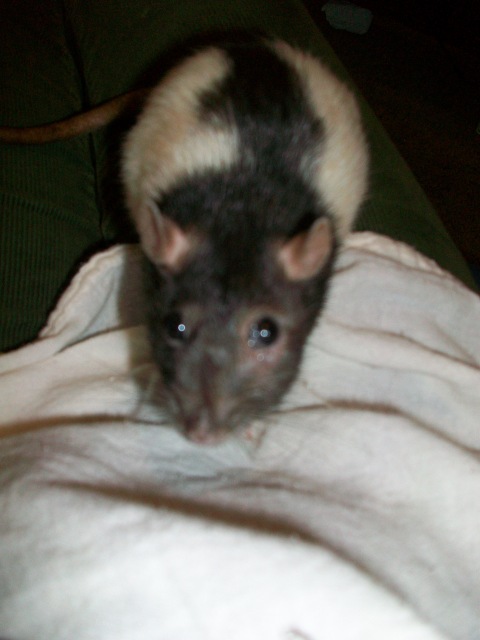 Half swollen face and eye looks like it could pop out.
QuestionQUESTION: My rat, Sage, has always been very sn
Half swollen face and eye looks like it could pop out.
QuestionQUESTION: My rat, Sage, has always been very sn
 Re prev post weird twitching before xmas
QuestionQUESTION: Unfortunately Soupy passed away as i
Re prev post weird twitching before xmas
QuestionQUESTION: Unfortunately Soupy passed away as i
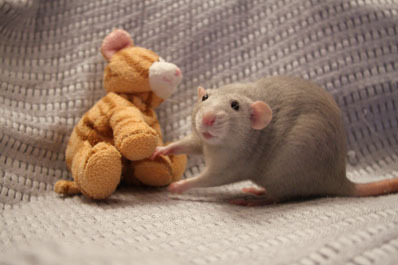 now not drinking or eating at all
Question
QUESTION: hi Sandy
I have a ratty quest
now not drinking or eating at all
Question
QUESTION: hi Sandy
I have a ratty quest
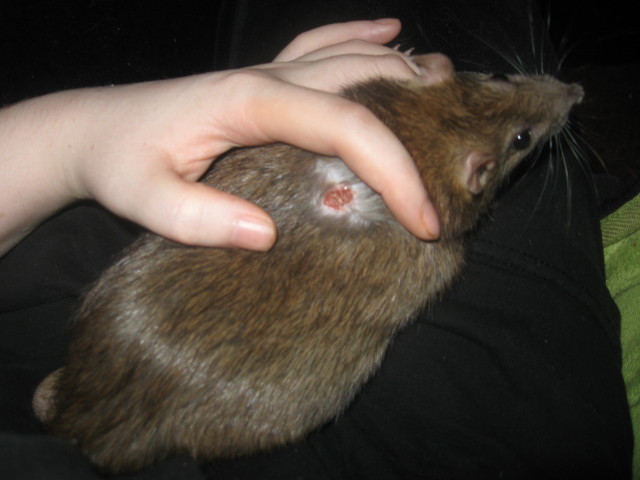 my colony is a mess and I dont have a caring or expierenced vet
Question
scabby rat
Two months ago I went to the vet fo
my colony is a mess and I dont have a caring or expierenced vet
Question
scabby rat
Two months ago I went to the vet fo
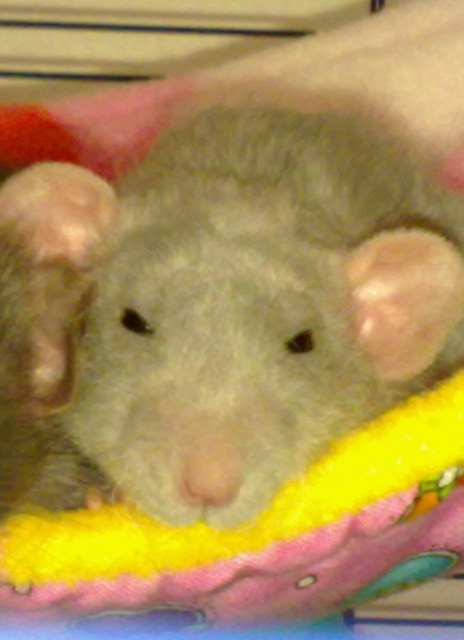 Luna
QuestionLuna
Chiara and Luna
QUESTION: Hi
Luna
QuestionLuna
Chiara and Luna
QUESTION: Hi